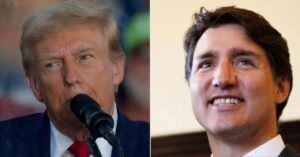The Controversy Surrounding Trump’s Suggestion of Annexing Canada
President-elect Donald Trump’s recent comments about annexing Canada have raised eyebrows and sparked a heated debate among internet users and news publications. While some have dismissed his remarks as jokes, Trump reiterated his desires for Canada to become the 51st state of the United States during a press conference at his Mar-a-Lago home on Tuesday, January 7.
Donald Trump’s proposal to annex Canada has left many puzzled and concerned about the potential implications of such a move. In his view, eliminating the border between the two countries would not only improve national security but also strengthen the relationship between the US and its northern neighbor. However, the idea of Canada losing its sovereignty and becoming a part of the United States has raised serious questions about the impact on both countries’ economies, cultures, and political systems.
While Donald Trump’s suggestion may seem far-fetched to some, it is important to analyze the underlying reasons behind his proposal and consider the potential consequences of such a drastic decision. In this article, we will delve into the controversy surrounding Trump’s annexation proposal and explore the various perspectives on this contentious issue.
The Historical Context of US-Canada Relations
Before delving into the current debate overDonald Trump’s annexation proposal, it is essential to understand the historical relationship between the United States and Canada. The two countries share the longest undefended border in the world and have a long history of cooperation and friendly relations.
Over the years, the US and Canada have worked together on various issues, including trade, security, and environmental protection. The North American Free Trade Agreement (NAFTA) has further strengthened economic ties between the two countries, making them each other’s largest trading partners.
Despite their close relationship, both countries have also maintained their distinct identities and sovereignty. Canada has its own government, legal system, and cultural heritage, which have shaped its unique identity as a nation. The idea of Canada becoming a part of the United States challenges this sovereignty and raises concerns about the preservation of Canadian values and traditions.
The Economic Implications of Annexing Canada
One of the primary concerns surrounding Donald Trump’s annexation proposal is the economic impact it would have on both countries. Canada is a major trading partner of the United States, with billions of dollars in goods and services exchanged between the two countries each year.
If Canada were to become a part of the United States, it would likely lead to significant changes in trade relations and economic policies. Canadian businesses and industries would have to adapt to US regulations and standards, which could affect their competitiveness and profitability. Similarly, American companies operating in Canada would face new challenges and uncertainties as they navigate the transition to a unified economy.
Moreover, the integration of Canada into the US economy could have broader implications for global trade and international relations. Canada’s membership in international organizations and agreements would be called into question, potentially disrupting diplomatic relations and alliances that have been carefully cultivated over the years.
The Cultural and Political Ramifications of Annexation
In addition to the economic implications, the annexation of Canada would also have profound cultural and political consequences. Canada prides itself on its multiculturalism, diversity, and social welfare programs, which differ significantly from the United States’ more individualistic and capitalist society.
If Canada were to become a part of the United States, there could be significant changes in social policies, healthcare systems, and government programs that could impact the quality of life for Canadians. The preservation of Canadian cultural identity and values would also be at risk as the country integrates into the American political and social framework.
Furthermore, the annexation of Canada could have far-reaching political implications for both countries. The addition of a new state to the United States would have implications for the balance of power in Congress, the electoral college, and the overall governance of the country. It could also raise questions about the representation of Canadian citizens in the US political system and the extent of their rights and privileges as new American citizens.
The Legal and Constitutional Challenges of Annexation
From a legal and constitutional perspective, the annexation of Canada presents numerous challenges and complexities that would need to be addressed before such a proposal could become a reality. The Canadian Constitution, for example, would need to be amended to allow for the country’s incorporation into the United States.
Moreover, the rights and responsibilities of Canadian citizens would need to be carefully considered to ensure a smooth transition and integration into the American legal system. Questions about dual citizenship, residency requirements, and voting rights would need to be addressed to protect the rights of both Canadian and American citizens in the event of annexation.
Additionally, the political will and support for such a drastic move would need to be carefully evaluated, as any attempt to annex Canada would likely face strong opposition from both Canadian and American citizens who value their countries’ sovereignty and independence.
Conclusion
As the debate over Donald Trump’s annexation proposal continues to unfold, it is clear that the idea of Canada becoming the 51st state of the United States is not a simple or straightforward matter. The economic, cultural, political, and legal implications of such a move are vast and complex, requiring careful consideration and analysis.
While some may view Donald Trump’s suggestion as a mere joke or a provocative statement, the underlying issues it raises are serious and deserve serious attention. The future of US-Canada relations and the sovereignty of both nations hang in the balance as the debate over annexation continues to evolve.
Ultimately, the decision to annex Canada would have far-reaching consequences for both countries and would require careful deliberation, negotiation, and cooperation to ensure a smooth and peaceful transition, should such a proposal ever come to fruition.
Discover What’s Trending Now in Our News Category!







